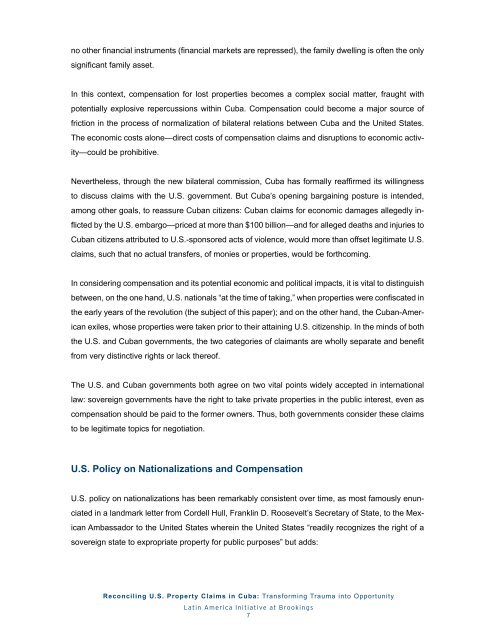Reconciling U.S Property Claims in Cuba
reconciling-us-property-claims-in-cuba-feinberg
reconciling-us-property-claims-in-cuba-feinberg
Create successful ePaper yourself
Turn your PDF publications into a flip-book with our unique Google optimized e-Paper software.
no other f<strong>in</strong>ancial <strong>in</strong>struments (f<strong>in</strong>ancial markets are repressed), the family dwell<strong>in</strong>g is often the only<br />
significant family asset.<br />
In this context, compensation for lost properties becomes a complex social matter, fraught with<br />
potentially explosive repercussions with<strong>in</strong> <strong>Cuba</strong>. Compensation could become a major source of<br />
friction <strong>in</strong> the process of normalization of bilateral relations between <strong>Cuba</strong> and the United States.<br />
The economic costs alone—direct costs of compensation claims and disruptions to economic activity—could<br />
be prohibitive.<br />
Nevertheless, through the new bilateral commission, <strong>Cuba</strong> has formally reaffirmed its will<strong>in</strong>gness<br />
to discuss claims with the U.S. government. But <strong>Cuba</strong>’s open<strong>in</strong>g barga<strong>in</strong><strong>in</strong>g posture is <strong>in</strong>tended,<br />
among other goals, to reassure <strong>Cuba</strong>n citizens: <strong>Cuba</strong>n claims for economic damages allegedly <strong>in</strong>flicted<br />
by the U.S. embargo—priced at more than $100 billion—and for alleged deaths and <strong>in</strong>juries to<br />
<strong>Cuba</strong>n citizens attributed to U.S.-sponsored acts of violence, would more than offset legitimate U.S.<br />
claims, such that no actual transfers, of monies or properties, would be forthcom<strong>in</strong>g.<br />
In consider<strong>in</strong>g compensation and its potential economic and political impacts, it is vital to dist<strong>in</strong>guish<br />
between, on the one hand, U.S. nationals “at the time of tak<strong>in</strong>g,” when properties were confiscated <strong>in</strong><br />
the early years of the revolution (the subject of this paper); and on the other hand, the <strong>Cuba</strong>n-American<br />
exiles, whose properties were taken prior to their atta<strong>in</strong><strong>in</strong>g U.S. citizenship. In the m<strong>in</strong>ds of both<br />
the U.S. and <strong>Cuba</strong>n governments, the two categories of claimants are wholly separate and benefit<br />
from very dist<strong>in</strong>ctive rights or lack thereof.<br />
The U.S. and <strong>Cuba</strong>n governments both agree on two vital po<strong>in</strong>ts widely accepted <strong>in</strong> <strong>in</strong>ternational<br />
law: sovereign governments have the right to take private properties <strong>in</strong> the public <strong>in</strong>terest, even as<br />
compensation should be paid to the former owners. Thus, both governments consider these claims<br />
to be legitimate topics for negotiation.<br />
U.S. Policy on Nationalizations and Compensation<br />
U.S. policy on nationalizations has been remarkably consistent over time, as most famously enunciated<br />
<strong>in</strong> a landmark letter from Cordell Hull, Frankl<strong>in</strong> D. Roosevelt’s Secretary of State, to the Mexican<br />
Ambassador to the United States where<strong>in</strong> the United States “readily recognizes the right of a<br />
sovereign state to expropriate property for public purposes” but adds:<br />
<strong>Reconcil<strong>in</strong>g</strong> U.S. <strong>Property</strong> <strong>Claims</strong> <strong>in</strong> <strong>Cuba</strong>: Transform<strong>in</strong>g Trauma <strong>in</strong>to Opportunity<br />
Lat<strong>in</strong> America Initiative at Brook<strong>in</strong>gs<br />
7


